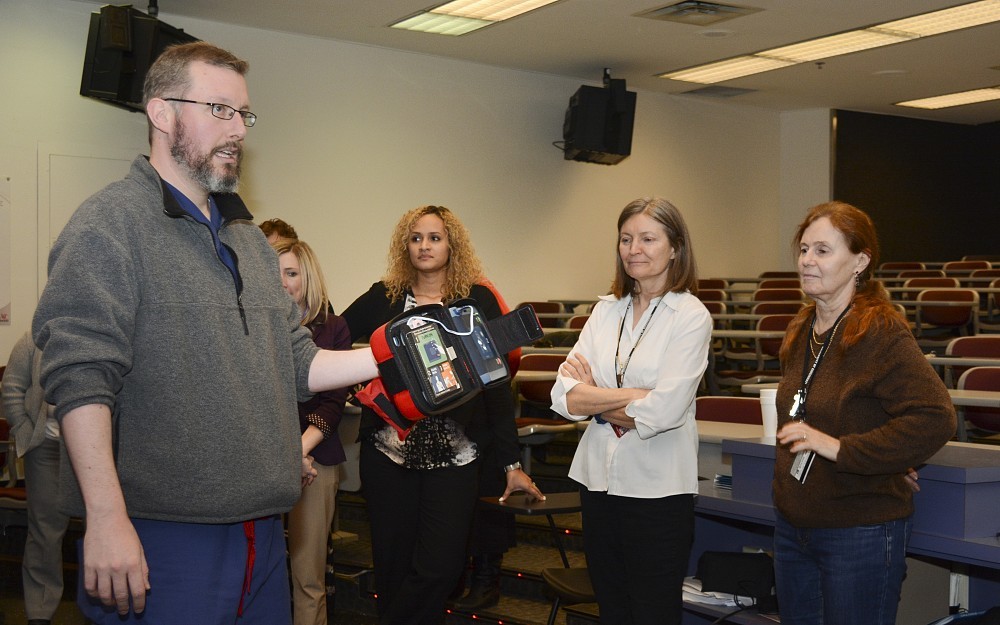
COM Installs Automated External Defibrillators, Offers CPR Training
The College of Medicine has installed automated external defibrillators (AEDs) in the Medical Sciences Building as a safety enhancement. To be reasonably accessible to all occupants and visitors of the CARE/Crawley Building, MSB and the Cardiovascular Center, the AEDs are located centrally in the MSB elevator lobbies on each floor, levels R through seven.
The devices arent intended to replace calls to 911 or the care of a medical professional but to provide a tool for first line response when necessary. The models installed dont require specialized training, but when activated, offer audio instructions along with follow-the-model pictures, says Jason McMullan, associate professor in the Department of Emergency Medicine.
McMullan held sessions in February to teach 57 volunteers how to use the AEDs and how to administer hands-only cardiopulmonary resuscitation (CPR) as part of the Take 10 Cincinnati initiative. The American Red Cross also offers instructions for hands-only CPR and AED use online.
"An AED can be lifesaving to the 10 to 20 percent of people who need one, but everyone suffering from cardiac arrest needs CPR, says McMullan. "We have been doing community outreach and teaching folks compression-only (hands-only) CPR so that when the time comes and someone collapses, a bystander can assist. We know that providing CPR before paramedics arrive will triple the chances that person will survive.
McMullan used role-play sessions to show volunteers what needs to happen if they encounter an individual who appears to have lost consciousness and in need of assistance. He asked his volunteers to follow three simple rules:
- Check to see if the person is responsive and breathing normally.
- If not, call 911 for help and ask a bystander to find an AED.
- Then, administer chest compressions at a rate of 100 per minute.
McMullan told volunteers not to worry about possible mistakes when administering CPR and using the AEDs.
"I would much rather go home and have another 40 Christmases with my family with a couple of broken ribs than to not go home at all, says McMullan. "Whether you do it or not, determines whether or not I get a chance to go home.
Some volunteers may grow tired giving chest compressions and wont be able to keep up the pace without a break. "Thats okay because the only bad CPR is no CPR, says McMullan. "If you are doing anything, you are improving their chances of survival.
Some individuals may be unconscious because of a heroin overdose or some other conditions.
"What if they dont need CPR or they are drunk and snoring? says McMullan. "If they wake up and say please stop, well you stop.
Another frequently asked question: Can I get sued if I make a mistake?
"Even if you do it absolutely wrong, you are protected by Good Samaritan laws, says McMullan. "Its okay.

Jason McMullan, MD, discusses use of automated external defibrillators installed in the Medical Sciences Building.

Faculty and staff in the College of Medicine learned how to use automated external defibrillators and how to perform CPR.

Automated external defibrillators such as this one are installed on every floor of the Medical Sciences Building.
Related Stories
UC researcher launches app to connect patients to lifesaving...
May 7, 2025
A cardiologist and researcher at UC’s College of Medicine joined the Venture Lab at the 1819 Innovation Hub to launch High Enroll, an app that links clinical trials with willing participants.
Growing heart failure epidemic calls for prioritizing primary...
May 5, 2025
A rapidly growing heart failure epidemic calls for prioritizing primary prevention, according to a new scientific statement from the American Heart Association published in Circulation in April. The statement reviews the current evidence for predicting heart failure risk and offers risk-based strategies for heart failure prevention.
Machine learning brings new insights to cell’s role in...
April 30, 2025
Researchers led by the University of Cincinnati’s Anna Kruyer and the University of Houston’s Demetrio Labate have published research in the journal Science Advances applying object recognition technology to track changes in brain cell structure and provide new insights into how the brain responds to heroin use, withdrawal and relapse.
